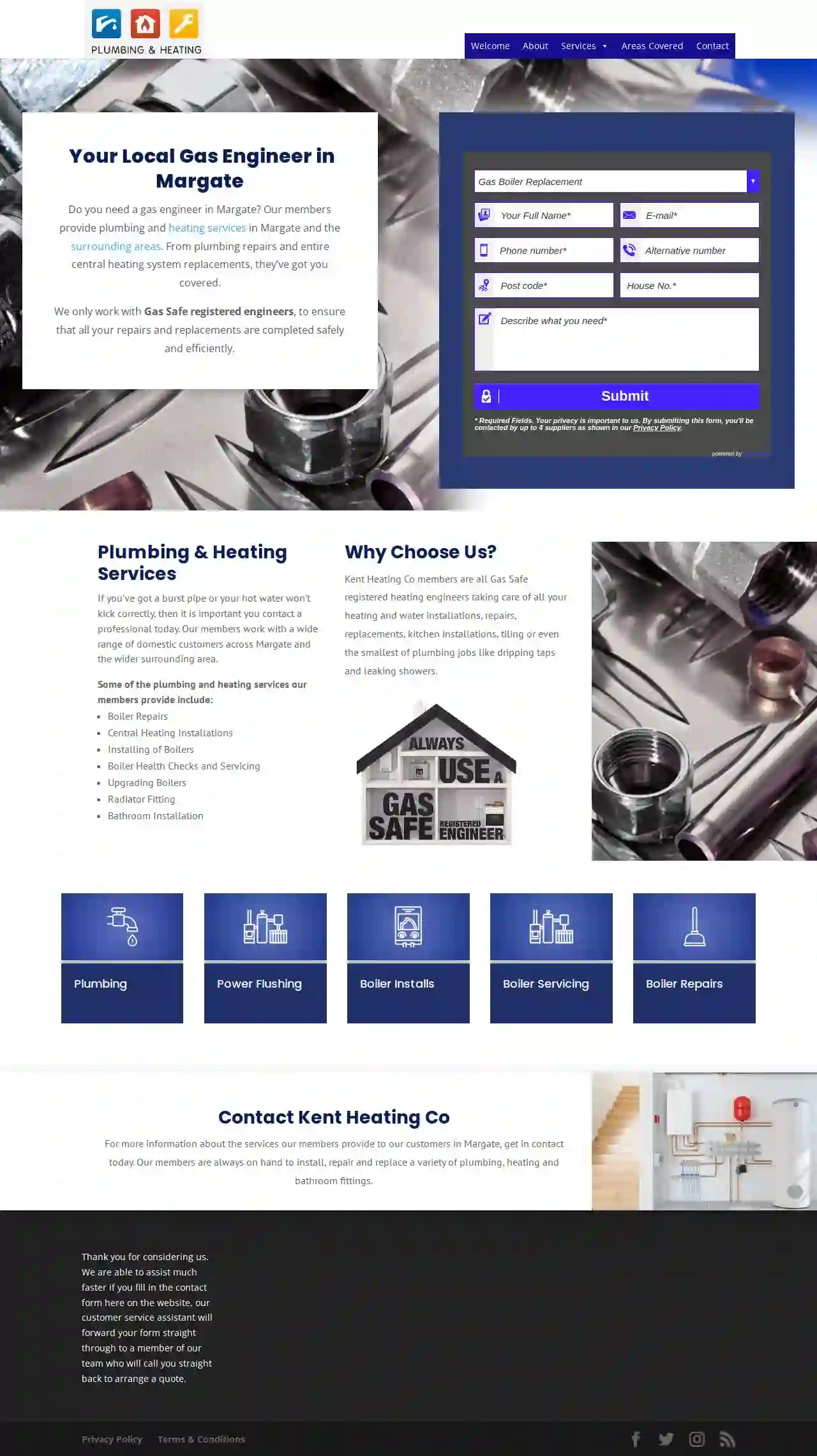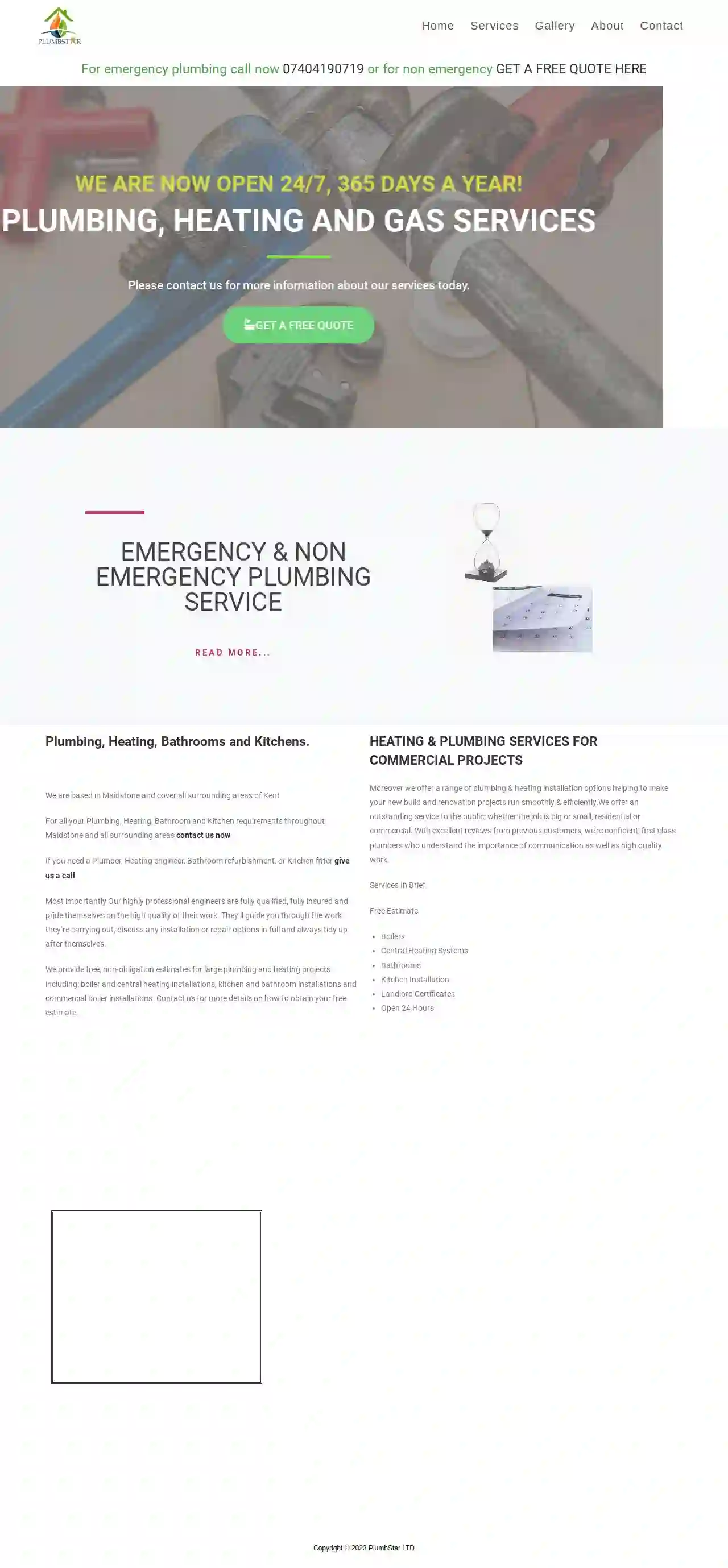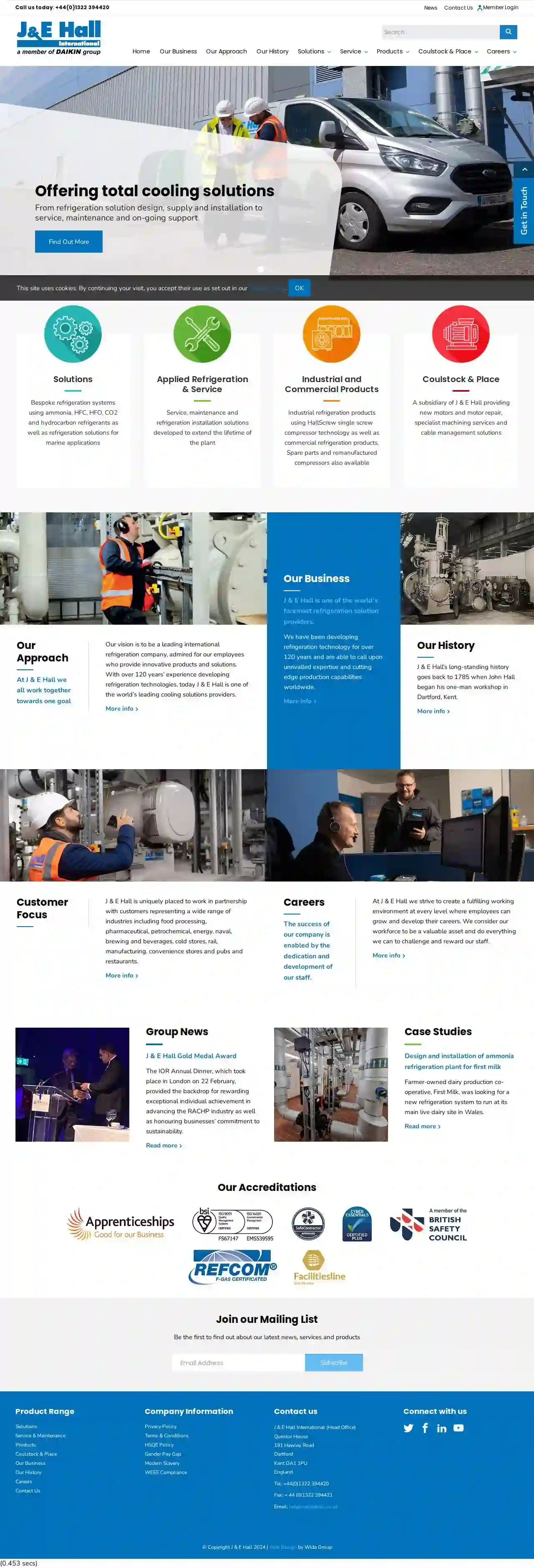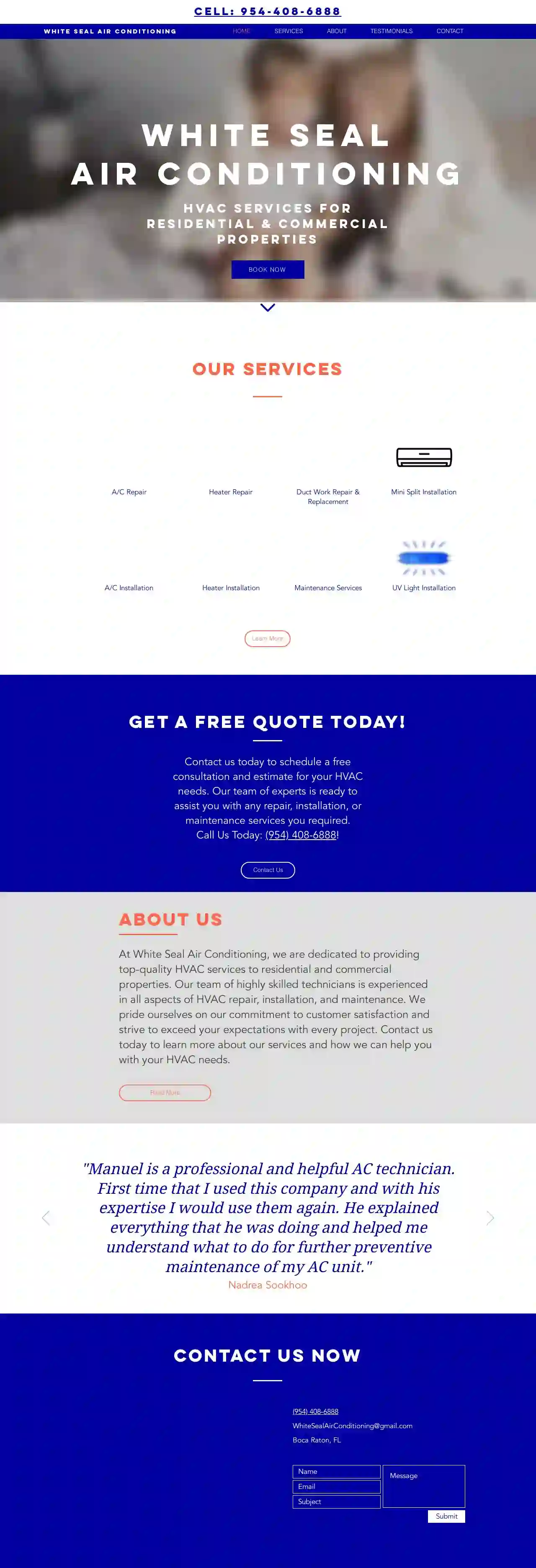HVAC Companies Iwade
Find the best AC and Heating Services in Iwade
Get 3 FREE HVAC Contractor quotes for your project today! Compare profiles, reviews, accreditations, portfolio, etc... and choose the best deal.

R J L Heating Services
Orpington, GBRJL Heating Services is a family run business for over 30 years based just outside Orpington in Kent. We are dedicated to providing a friendly, helpful and professional service. As professional engineers and plumbers in South East London, we can provide a wide range of plumbing and heating services. We have been a family run business for over 30 years and are dedicated to providing friendly, helpful and professional heating and plumbing services. Our heating and plumbing services cover repairs, maintenance and installation and we have a no job is too big or small approach. When you choose RJL Heating, we’ll work closely with you from start to finish to ensure all your requirements are met. Should you be in need of an engineer or plumber in South East London, then be sure to contact us.
- Services
- Why Us?
- Gallery
Get Quote
Go Assist - Appliance Repairs, Plumbers, Boiler Engineers & Electricians
51 reviewsEnterprise House, 21 Oxford Road, Bournemouth, ME16 8EZ, GBThe UK'S Trusted Repair Specialists At Go Assist we provide a one-stop solution for homeowners and landlords, offering services regarding plumbing, electrical, appliances, boilers, locksmiths and pest control. Whether your domestic appliance is faulty, boiler has broken down, fuse box has tripped, or tap is leaking – you have come to the right place. We provide quality repairs for home breakdowns from a team of reliable, vetted engineers. We will always aim to get out to you the same day, boasting an impressive engineer response time and first-time fix rate. Our engineers are not only repair experts but are qualified to assist with installations and replacements such as light fittings, toilets, and showers, making home improvements an easy stress-free process. We are proud to provide services to help landlords abide by the necessary rules and regulations by carrying out boiler services, EPCS, and EICRs in rented properties.
- Services
- Why Us?
- Gallery
Get Quote
HeatFix - Emergency Plumber in Dartford
52 reviews99 High Rd, Dartford, DA2 7BW, GBHeatFix - Emergency Plumber in Dartford offers fast and specialist solutions to plumbing and heating emergencies. Our highly-trained professionals are available immediately for same-day call-outs. Gas and water emergencies can be very serious if ignored or left too long, which is why we offer emergency plumbing 24 hours a day, seven days a week. No matter where in the UK you live, we will be on hand to fix your plumbing problem and get you back to normality. A plumbing emergency can turn into a plumbing disaster very quickly. Don’t wait for things to get worse. Contact our emergency plumbers on 01322 466918 immediately. Our services include: Plumbing Pipe Work Pumps & Valves Showers supplied & fitted Tanks & Overflows Toilets, Systems & Taps Bathroom Suites Emergency Work Same day call outs Heating Services: Boiler Repair Boiler Servicing Radiator Repair Radiator Replacement Temperature Controls Power Flushing A-rated Central Heating Boiler Installs & Swaps Landlord Safety Certs (CP12) Emergency Call Outs: 24 Hour Call Outs Water Leaks Boiler Repairs Internal Drainage Blocked Toilet / Sink Why Choose Us? Our heating & plumbing repair and installation technicians are some of the best. Their skill, attitude and experience have meant that we have become a well-known company. 24/7 Emergency Always available to take your call, and send an engineer to help if your in an emergency. Expert and Professional We pride ourselves on our team of experienced professionals Satisfaction Guarantee We guarentee only the upmost quality Where to find us 99 High Rd, Dartford DA2 7BW OPENING HOURS Saturday Open 24 Hours Sunday Open 24 Hours Monday Open 24 Hours Tuesday Open 24 Hours Wednesday Open 24 Hours Thursday Open 24 Hours Friday Open 24 Hours Copyright 2020 | HeatFix - Emergency Plumber in Dartford
- Services
- Why Us?
- Gallery
Get Quote
Efficient Air & Heating
4.740 reviews3469 Cocoplum Circle, Coconut Creek, 33063, GBEfficient Air & Heating is a trusted name in Coral Springs, FL, providing quality air conditioning and heating services since 1993. We are dedicated to complete customer service and ensuring your HVAC system runs its best. Our experienced team offers a wide range of services, including AC installation, repairs, tune-ups, heating repairs, installations, and tune-ups, as well as furnace repairs, furnace replacements, heat pump repairs, air cleaners, dryer vent cleaning, and duct cleaning. We proudly serve homeowners and businesses in Coral Springs and surrounding areas, including Boca Raton, Coconut Creek, Deerfield Beach, Delray Beach, Fort Lauderdale, Lighthouse Point, Margate, Parkland, Pompano Beach, and Boynton Beach.
- Services
- Why Us?
- Our Team
- Testimonials
- Gallery
Get Quote
Stanley Gas & Heating
53 reviewsBroadstairs, Kent, Unit 1, 10-12, The Broadway, CT9 4AA, GBKent Heating Co is a network of Gas Safe registered heating engineers serving Kent and the surrounding areas. They provide a comprehensive range of plumbing and heating services, from small repairs like dripping taps to large-scale installations like central heating systems. Their team of experienced engineers is dedicated to ensuring all work is completed safely and efficiently. Whether you need a boiler repair, a new boiler installation, or help with your central heating, Kent Heating Co can help.
- Services
- Why Us?
- Gallery
Get Quote
Advance Domestic Appliances Euronics Sales and Repairs
4.722 reviews100 High Street, Whitstable, CT5 1AA, GBAdvance is a local retailer offering a wide range of home appliances, from TVs and entertainment systems to laundry, refrigeration, dishwashers, cooking appliances, small appliances, floorcare, and more. They pride themselves on hand-picked products, flexible delivery options, expert advice, and local service. Customers can enter their postcode to check stock and pricing at their local Euronics store.
- Services
- Why Us?
- Gallery
Get Quote
Gas Heating Services
4.520 reviewsShop 6 130 Hagley Road, Halesowen, B63 1DY, GBGas Heating Services (WM) Limited is a Gas Safe registered company based in Halesowen, West Midlands, specializing in gas heating services. We offer a comprehensive range of services, including boiler installations, servicing, full central heating system design and installation, landlord gas inspections, warm air systems, and more. Our team of experienced engineers is dedicated to providing high-quality workmanship and exceptional customer service. We understand the importance of a reliable and efficient heating system, and we strive to ensure that all our clients are comfortable and satisfied with our services. Whether you need a new boiler, a regular service, or repairs, Gas Heating Services (WM) Limited is here to help. We also offer a wide range of plumbing services to our domestic clients, from general plumbing repairs to burst or broken pipes. As a Gas Safe registered company, you can be assured that all our work is carried out to the highest standards of safety and compliance. If you are a landlord, it is essential to ensure that your annual gas safety check is performed by a Gas Safe registered engineer every year. We can provide you with a comprehensive gas safety inspection service to ensure that your property meets all the necessary regulations. Get in touch with Gas Heating Services today to arrange a home visit or call us on 0121 503 0066 if you have any questions. We look forward to hearing from you.
- Services
- Why Us?
- Accreditations
- Our Team
- Testimonials
- Gallery
Get Quote
PLUMBSTAR LTD
535 reviewsMaidstone, GBPlumbStar LTD is a professional plumbing, heating, and gas services company based in Maidstone, Kent. We provide a range of services, including boiler and central heating installations, kitchen and bathroom installations, and commercial boiler installations. Our highly qualified and insured engineers pride themselves on their high-quality work and excellent customer service. We offer free, non-obligation estimates for large plumbing and heating projects and are open 24/7, 365 days a year. With excellent reviews from previous customers, we're confident in our ability to provide first-class plumbing services to both residential and commercial clients.
- Services
- Why Us?
- Gallery
Get Quote
J & E Hall Ltd
12 reviewsQuestor House, 191 Hawley Road, Dartford, DA1 1PU, GBJ & E Hall is one of the world’s leading cooling solutions providers, with over 120 years of experience in developing refrigeration technologies. They offer a comprehensive range of products and services, from bespoke refrigeration systems to industrial and commercial refrigeration products, as well as spare parts and remanufactured compressors. J & E Hall is committed to providing innovative and energy-efficient solutions to meet the needs of their customers worldwide.
- Services
- Why Us?
- Gallery
Get Quote
White Seal Air Conditioning LLC
515 reviewsBoca Raton, GBAt White Seal Air Conditioning, we are dedicated to providing top-quality HVAC services to residential and commercial properties. Our team of highly skilled technicians is experienced in all aspects of HVAC repair, installation, and maintenance. We pride ourselves on our commitment to customer satisfaction and strive to exceed your expectations with every project. Contact us today to learn more about our services and how we can help you with your HVAC needs.
- Services
- Why Us?
- Testimonials
- Gallery
Get Quote
Over 12,692+ HVAC Companies on our directory
Our HVAC experts operate in Iwade & surroundings!
HVACCompaniesHub has curated and vetted Top HVAC Companies in Iwade. Find the most reliable contractor today.
Frequently Asked Questions About HVAC Companies
- Regular Air Filter Replacement: Change or clean your HVAC system’s air filters regularly (every 1-3 months).
- Professional Air Duct Cleaning: Have your air ducts cleaned by professionals every few years to eliminate dust, mold, and other contaminants.
- Improve Ventilation: Ensure adequate ventilation in your home to bring in fresh air and exhaust stale air. Use exhaust fans in kitchens and bathrooms.
- Control Humidity Levels: Use a humidifier or dehumidifier to maintain optimal humidity levels and prevent mold growth.
- Clean Regularly: Dust and vacuum frequently to minimize airborne particles.
- Avoid Smoking Indoors: Smoking indoors significantly reduces IAQ.
- Use Natural Cleaning Products: Opt for natural cleaning products that don’t release harmful VOCs (volatile organic compounds).
- Monitor Indoor Air Quality: Consider using an indoor air quality monitor to track pollutant levels.
- Frequent Repairs: If your system requires repairs frequently, it may be more cost-effective to replace it.
- Age of System: HVAC systems typically last 15-20 years. If your system is nearing or beyond that age, it's likely less efficient and more prone to breakdowns.
- Increased Energy Bills: A significant rise in energy bills could indicate your system is losing efficiency and needs replacement.
- Uneven Temperatures: If some rooms are too hot or too cold, it could be a sign of an inefficient HVAC system.
- Poor Indoor Air Quality: If you're experiencing allergies, dust, or other indoor air quality issues, a new HVAC system with better filtration could help.
- Strange Noises or Smells: Unusual noises or foul odors emanating from your HVAC system could signal a problem that requires a system replacement.
- Age: Furnaces typically last 15-20 years. If yours is significantly older, replacement is often the better long-term choice.
- Frequency and Cost of Repairs: If you've been having frequent or expensive repairs, replacing the furnace might be more cost-effective in the long run.
- Energy Efficiency: Newer furnaces are significantly more energy-efficient, which can lead to lower energy bills.
- Safety Concerns: Older furnaces might have safety issues, such as carbon monoxide leaks. A new furnace offers enhanced safety features.
How can I improve my home's indoor air quality?
What are the signs that I need a new HVAC system?
Should I repair or replace my old furnace?
What are the benefits of a programmable thermostat?
How can I improve my home's indoor air quality?
- Regular Air Filter Replacement: Change or clean your HVAC system’s air filters regularly (every 1-3 months).
- Professional Air Duct Cleaning: Have your air ducts cleaned by professionals every few years to eliminate dust, mold, and other contaminants.
- Improve Ventilation: Ensure adequate ventilation in your home to bring in fresh air and exhaust stale air. Use exhaust fans in kitchens and bathrooms.
- Control Humidity Levels: Use a humidifier or dehumidifier to maintain optimal humidity levels and prevent mold growth.
- Clean Regularly: Dust and vacuum frequently to minimize airborne particles.
- Avoid Smoking Indoors: Smoking indoors significantly reduces IAQ.
- Use Natural Cleaning Products: Opt for natural cleaning products that don’t release harmful VOCs (volatile organic compounds).
- Monitor Indoor Air Quality: Consider using an indoor air quality monitor to track pollutant levels.
What are the signs that I need a new HVAC system?
- Frequent Repairs: If your system requires repairs often, it may be more cost-effective to replace it.
- Age of System: HVAC systems typically last 15-20 years. If your system is nearing or beyond that age, it's likely less efficient and more prone to breakdowns.
- Increased Energy Bills: A significant rise in energy bills might mean your system is losing efficiency and needs replacement.
- Uneven Temperatures: If some rooms are too hot or too cold, it could be a sign of an inefficient HVAC system.
- Poor Indoor Air Quality: If you're experiencing allergies, dust, or other indoor air quality issues, a new HVAC system with better filtration could help.
- Strange Noises or Smells: Unusual noises or foul odors emanating from your HVAC system could signal the need for a new HVAC system.
Should I repair or replace my old furnace?
- Age: Furnaces typically last 15-20 years. If yours is significantly older, replacement is often the better overall choice.
- Frequency and Cost of Repairs: If you've been having repeated repairs, replacing the furnace might be more cost-effective in the long run.
- Energy Efficiency: Newer furnaces are significantly more energy-efficient, which can lead to lower energy bills.
- Safety Concerns: Older furnaces can pose safety risks, such as carbon monoxide leaks. A new furnace offers enhanced safety features.